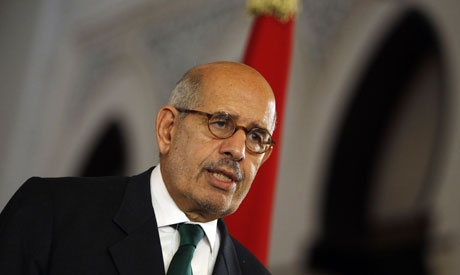
Mohamed ElBaradei (Reuters)
Egypt’s former vice president Mohamed ElBaradei denied on Tuesday that he had asserted in a 1982 academic paper that the two Red Sea islands Egypt recently handed to Saudi Arabia were indeed Saudi.
The Egyptian government had cited ElBaradei's use of the word "occupation" in the paper when describing Egypt's control over the islands as "proof" that they were considered Saudi-owned.
Egypt's assertion last Friday that Tiran and Sanafir Islands – which have long been under Egyptian control – fall within regional Saudi maritime waters triggered a huge wave of controversy in Egypt.
Egypt's decision to hand over the islands to Saudi Arabia is pending ratification by the Egyptian parliament.
On Monday, the cabinet's Information and Decision Support Centre documented the chronology of reports supporting the Saudi claim to the islands, which are located in the Gulf of Aqaba.
The statement cited a screen shot of an article by ElBaradei, a Nobel laureate and international lawyer, taken from the American Journal of International Law.
The article, titled 'The Egyptian-Israeli Peace Treaty and Access to the Gulf of Aqaba: A New Legal Regime,' states that “the islands of Tiran and Sanafir... have been under Egyptian occupation since 1950.”
The article also says that the Strait of Tiran is “within the territorial sea of Egypt.”
ElBaradei said on his official Twitter account that his use of the word “occupation” simply denoted possession and control.
“I didn’t go into the issue of ownership, which is settled according to facts, historical documents and resorting to international law,” ElBaradei added.
The Egyptian government says that its decision comes after a six-year process of studies and 11 rounds of negotiations between officials and experts from Cairo and Riyadh.
Short link: